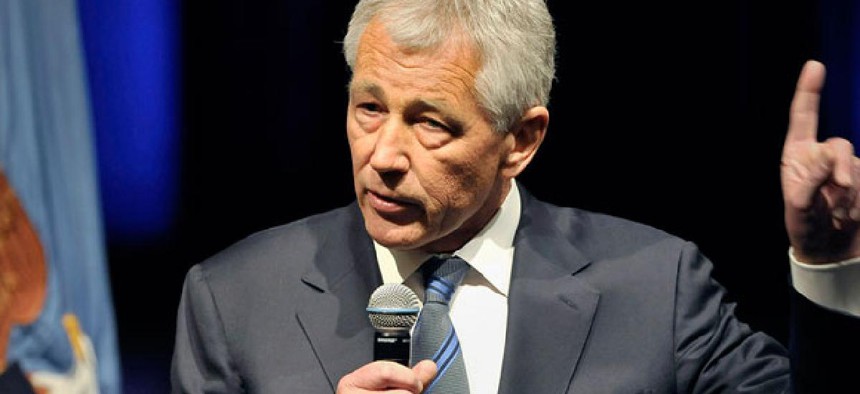
Defense Department
Analysis: The Rehabilitation of Chuck Hagel
Beyond the sequester, the new Pentagon chief plans a fast trip, and a focus on veterans.
Having been ushered into his job as Defense secretary with the biggest dissenting Senate vote in U.S. history, Chuck Hagel appears to be already a politically damaged figure. And now, adding injury to insult, the first thing the new Defense secretary must do is go back to the Congress that roughed him up during his confirmation process and … beg some more. In order to minimize the effects of the imminent sequester, Hagel needs legislative authority to give him more discretion to move around money as the Defense Department is hit with $46 billion in cuts.
So it’s bound to be a rough first few days. “We need to figure this out,” Hagel told Pentagon employees in a town hall-style meeting shortly after being sworn in on Wednesday.
But Hagel and his team are quickly laying plans for what happens after the sequester hits in what is likely an effort to rehabilitate his image. Hagel will take his first overseas trip “in the very near future,” according to a Defense official. Though Pentagon officials won’t say, the new secretary is almost certain to visit U.S. troops in Afghanistan or elsewhere around the world, feeding off the popularity he is already enjoying among the military as the first enlisted man ever to be named the department's chief.
It’s traditional, of course, for a new Defense secretary to visit troops abroad, but Hagel is also stressing his credentials as a champion of veterans — most recently, as senator, coauthoring the post-9/11 GI bill — at a time when there are going to be a lot more of them returning home in coming months. “Much of my life has been about doing everything I could in some way to help veterans and their families,” Hagel told the Pentagon employees. “I'm more proud of that than any businesses or anything else I've been involved in.”
So Hagel may remain unpopular on Capitol Hill, but as he works to earn appreciation and sympathy from his new charges around the world, that could give the critics in Congress pause. Expect, for one thing, to hear repeated allusions to Hagel’s combat service in Vietnam as a perfect preparation for the winding down of two decade-long wars. “Secretary Hagel knows what it’s like to come home from war,” says an aide.
And Hagel has publicly expressed anguish over the number of military suicides stemming from post-combat stress after deployment in Afghanistan and Iraq. “Look at what we’ve done to our force structure,” he told National Journal in 2011. “There are a record number of suicides, record divorces. It’s devastating what we’ve done to our poor [military] people.” Hagel, says the aide, will “absolutely” be focusing on many of these internal Pentagon issues, such as mental health, post-traumatic stress disorder, and sexual harassment.
And with a president who appears fully in sync with him, Hagel has every intention of overseeing a new era in American defense policy, one that is likely to be pared down. Through Hagel, Obama in his second term is likely to restore a traditionally conservative way of thinking about foreign policy and the use of force that hasn’t been seen in decades, perhaps since the Eisenhower years. Obama’s first-term reluctance to intervene in Libya — before he finally decided on a support role for France and Britain, and through NATO — and his vetoing of a proposal to arm Syrian rebels are strong indications of where the president is going, and that approach reflects Hagel’s deeply held views as well.
That may never be popular with the neoconservatives who still revile Hagel, but it’s likely to gain the support of the American people. According to a recent Pew Research Center poll, only about a quarter of Americans (27 percent) say the U.S. has a responsibility to do something about the fighting in Syria, while more than twice as many (63 percent) say it does not.
Hagel will also be building new bridges to his sometime critics, including those who are more hawkish than he. Aides say one of the first congratulatory calls Hagel got after his confirmation came from former Secretary of State Madeleine Albright, who once upon a time was known as a pro-interventionist hawk. (In his memoirs, Colin Powell wrote that when he was chairman of the Joint Chiefs during the Clinton years, he almost had "an aneurysm" when Albright asked him: "What's the point of having this superb military you're always talking about if we can't use it?")
Hagel aides, meanwhile, are still doing postmortems on Hagel’s ill-fated Senate confirmation hearing — and readying him for his next appearance. Pentagon officials who had briefed Hagel were shocked that so few of the questions he was asked were related to the issues he’d been briefed up on — current policy on deployments and budget issues, which he is much more likely to asked about next time. “He prepped for all the things he would do as secretary of Defense,” says the aide. “But we were caught off guard by an Armed Services Committee that allowed a TV to be rolled into the room to play an Al Jazeera video from three years ago.” Hagel was then asked, by freshman Sen. Ted Cruz, R-Texas, about an old, indistinct interview in which he did not rebut a caller's charges that Israel had committed war crimes. “How do you prepare for that?” the aide said.
Hagel will likely be far more prepared now — for a comeback, among other things.







